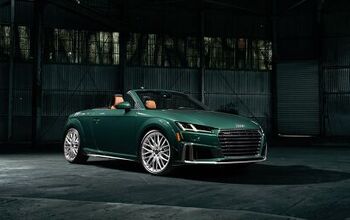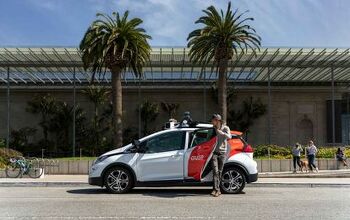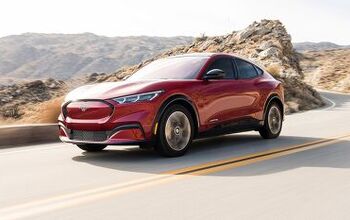Germany Forced to Appear Proactive as Anti-diesel Prejudice Swells in Europe

With Paris, Madrid, Athens, and Mexico City all pledging to ban diesel vehicles from entry within the next few years, the fuel’s future doesn’t look particularly bright. While citywide bans like these are becoming increasingly popular in Europe, diesel vehicles still account for almost half of the continent’s registered vehicles.
Germany, which has been speedily moving away from the fuel since Volkswagen’s emissions fiasco, provided more than its fair share of those diesel-powered models. It’s been mulling over how to handle it’s own regulatory matters pertaining to the fuel and the rest of the European Union’s intense pressure doesn’t seem to have fazed it.
Instead of enacting the same transportation ban on diesel vehicles as seen in Paris, Germany has decided to furnish its automakers with the opportunity to clean up their act. Industry officials and politicians have agreed to implement software updates on existing vehicles specifically to keep them eligible for operation within major metropolitan areas. Considering Mercedes-Benz just offered to “voluntarily” recall 3 million Euro-spec cars fitted with diesel engines, that’s incredibly good timing. Likewise, Volkswagen Group claims it will update 850,000 Porsche and Audi vehicles equipped with larger diesel motors.
The plan amounts to roughly 2 billion euros ($2.33 billion), with Germany’s automotive industry willing to expend around 100 euros per car. The benefit is that those potentially illegal vehicles get to stay on the road and the country looks like it actually did something. Ideally, it should result in some nine million existing vehicles conforming to Euro 5 or 6 emission standards — reducing NOx emissions by around 20 percent. However, when you look at some of the previous software-based emission fixes, a lot of those diesels behaved differently after being tuned while still emitting roughly the same amount of pollutants as before.
As difficult as this is to say, it may actually have been more responsible to ban diesels in major cities. While this is not an endorsement of the practice, banning diesels makes a future purchase less appetizing while also forcing current owners to use public transit solutions. Tangible results can be gained by legislating an unfair prejudice against diesel motors. Meanwhile, fixing an existing vehicle’s software just seems like a way to make it appear as if you’re doing something meaningful.
The European Union’s industry commissioner, Elżbieta Bieńkowska, addressed the continent’s transport ministers by threatening to ban diesel vehicles outright unless new and existing models are cleaned up before 2018. While a number of things would have to go her way to make that a reality, she can certainly draft a commission plan for the EU and get the ball rolling within that timeframe.
Reuters report s that a committee will be set up to measure the impact that updating diesel cars would have on individual communities and cities, with an aim of avoiding a sweeping ban. Auto industry executives and German Transport Minister Alexander Dobrindt are due to discuss diesel pollution at a summit on August 2nd.
Unlike Daimler and Volkswagen Group, BMW stated there was no reason for it to issue a voluntary recall ahead of the summit.

A staunch consumer advocate tracking industry trends and regulation. Before joining TTAC, Matt spent a decade working for marketing and research firms based in NYC. Clients included several of the world’s largest automakers, global tire brands, and aftermarket part suppliers. Dissatisfied with the corporate world and resentful of having to wear suits everyday, he pivoted to writing about cars. Since then, that man has become an ardent supporter of the right-to-repair movement, been interviewed on the auto industry by national radio broadcasts, driven more rental cars than anyone ever should, participated in amateur rallying events, and received the requisite minimum training as sanctioned by the SCCA. Handy with a wrench, Matt grew up surrounded by Detroit auto workers and managed to get a pizza delivery job before he was legally eligible. He later found himself driving box trucks through Manhattan, guaranteeing future sympathy for actual truckers. He continues to conduct research pertaining to the automotive sector as an independent contractor and has since moved back to his native Michigan, closer to where the cars are born. A contrarian, Matt claims to prefer understeer — stating that front and all-wheel drive vehicles cater best to his driving style.
More by Matt Posky
Latest Car Reviews
Read moreLatest Product Reviews
Read moreRecent Comments
- Honda1 Unions were needed back in the early days, not needed know. There are plenty of rules and regulations and government agencies that keep companies in line. It's just a money grad and nothing more. Fain is a punk!
- 1995 SC If the necessary number of employees vote to unionize then yes, they should be unionized. That's how it works.
- Sobhuza Trooper That Dave Thomas fella sounds like the kind of twit who is oh-so-quick to tell us how easy and fun the bus is for any and all of your personal transportation needs. The time to get to and from the bus stop is never a concern. The time waiting for the bus is never a concern. The time waiting for a connection (if there is one) is never a concern. The weather is never a concern. Whatever you might be carrying or intend to purchase is never a concern. Nope, Boo Cars! Yeah Buses! Buses rule!Needless to say, these twits don't actual take the damn bus.
- MaintenanceCosts Nobody here seems to acknowledge that there are multiple use cases for cars.Some people spend all their time driving all over the country and need every mile and minute of time savings. ICE cars are better for them right now.Some people only drive locally and fly when they travel. For them, there's probably a range number that works, and they don't really need more. For the uses for which we use our EV, that would be around 150 miles. The other thing about a low range requirement is it can make 120V charging viable. If you don't drive more than an average of about 40 miles/day, you can probably get enough electrons through a wall outlet. We spent over two years charging our Bolt only through 120V, while our house was getting rebuilt, and never had an issue.Those are extremes. There are all sorts of use cases in between, which probably represent the majority of drivers. For some users, what's needed is more range. But I think for most users, what's needed is better charging. Retrofit apartment garages like Tim's with 240V outlets at every spot. Install more L3 chargers in supermarket parking lots and alongside gas stations. Make chargers that work like Tesla Superchargers as ubiquitous as gas stations, and EV charging will not be an issue for most users.
- MaintenanceCosts I don't have an opinion on whether any one plant unionizing is the right answer, but the employees sure need to have the right to organize. Unions or the credible threat of unionization are the only thing, history has proven, that can keep employers honest. Without it, we've seen over and over, the employers have complete power over the workers and feel free to exploit the workers however they see fit. (And don't tell me "oh, the workers can just leave" - in an oligopolistic industry, working conditions quickly converge, and there's not another employer right around the corner.)































Comments
Join the conversation
Personally, I wouldn't have a diesel car/truck/CUV. For locomotives, buses and semis, as well as other heavy equipment, fine.
Neither do I want a diesel. Smelly, dirty and noisy. I do not drive enough to justify the cost of a diesel. I would rather have a hybrid.